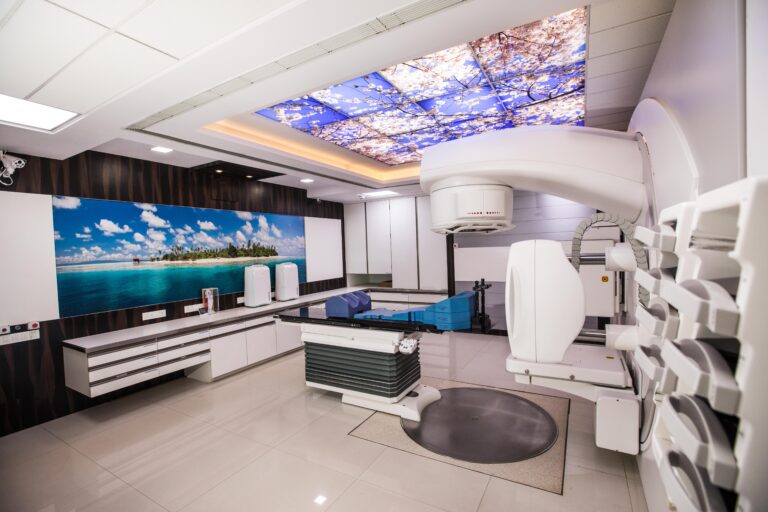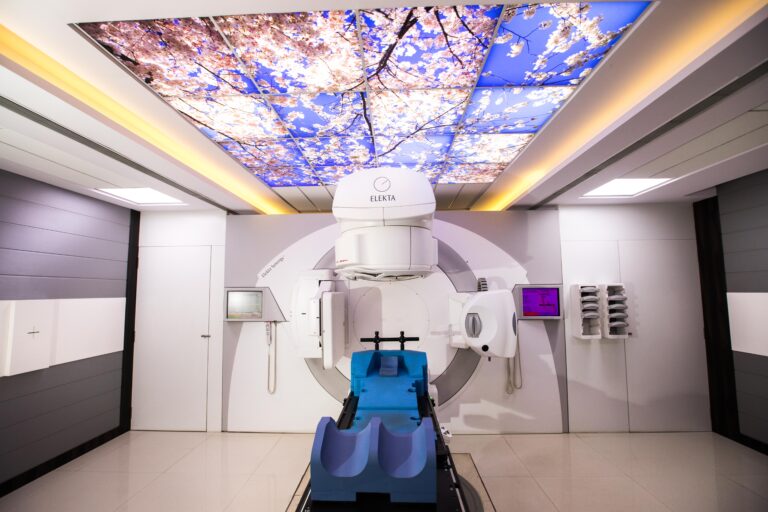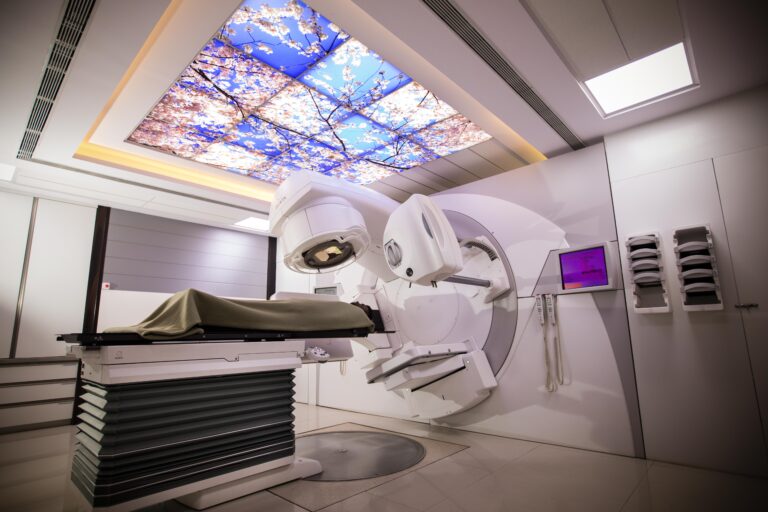Radiation Oncology in Pune
- Home
- Radiation Oncology in Pune



Radiation Oncology at ICTRC Onco-Life Cancer Centre, Wagholi
Advanced Cancer Care with Precision, Comfort, and Compassion
At ICTRC Onco-Life Cancer Centre, Wagholi, we bring together the latest technology in radiation therapy, a team of nationally trained experts, and a commitment to personalized patient care — all under one roof.
Radiation therapy is one of the most important tools in treating cancer. In fact, more than 60% of cancer patients need radiation at some point in their treatment. At our centre, we use state-of-the-art machines and globally accepted protocols to make radiation therapy safer, faster, and more effective.
Two Types Of Radiation Therapy
- External Radiation Therapy Delivered from outside the body using a machine called a Linear Accelerator (LINAC).
- Internal Radiation Therapy (Brachytherapy) Involves placing a small radioactive source inside the body, close to or within the tumour.
External Radiation Therapy – Elekta Synergy with Agility
We are proud to offer treatment using Elekta Synergy with Agility, one of the most advanced linear accelerators in the world. This high-precision machine is used by only a few cancer centres across India and allows us to:
- Target only the cancer-affected area
- Avoid damaging healthy tissues and organs
- Achieve over 99% accuracy in radiation delivery
Our linear accelerator is equipped with cone-beam CT imaging, a 6D robotic couch, and 160 multileaf collimators which adjust the radiation beam to match the exact shape and size of your tumour.
Advanced Radiation Modalities Available at ICTRC, Wagholi
Each patient’s treatment is tailored using a combination of the following cutting-edge technologies:
3D Conformal Radiation Therapy (3D-CRT)- Shapes the radiation beam to match the tumour, sparing healthy tissues
- Uses real-time imaging to precisely target the tumour before each session
- Delivers radiation with varying intensity using 160 beam-shaping “fingers” to wrap around the tumour and protect normal tissue
- Provides the same benefit as IMRT but in shorter treatment times
- Highly focused treatment ideal for lung, liver, or spinal tumours, given in fewer sessions
- Delivers multiple, accurate beams to brain or spinal tumours, especially in areas where surgery is risky
- Used before bone marrow or stem cell transplants, especially for leukemia and lymphoma patients
- A specialized method for treating cancers that involve the skin, like cutaneous T-cell lymphoma
- Special technique for left-sided breast cancer, which helps reduce exposure to the heart and lungs during radiation
Internal Radiation Therapy – Brachytherapy
Our centre is equipped with the Varian GAMMAMEDPLUS IX (24-channel) Brachytherapy system — one of the most advanced internal radiation technologies available worldwide.
What is Brachytherapy?
- Small radioactive implants (like seeds, wires, or capsules) are placed inside or near the tumour
- These implants deliver high radiation doses directly to the cancer while sparing nearby healthy tissues
- It may be used alone or along with external radiation or surgery
When is Brachytherapy Used?
- Commonly used for cervical, uterine, breast, prostate, head & neck, and esophageal cancers
- Especially effective after surgery, to destroy any remaining cancer cells
Our Radiation Oncology Team
Cancer care is never a one-person job. At ICTRC Onco-Life Cancer Centre, we have a multidisciplinary team that works together to ensure you receive the best care possible:
- Board-Certified Radiation Oncologists
- Medical Physicists
- Licensed Radiation Therapists
- Medical Oncologists and Surgeons
- Nurses, Counselors, Nutritionists, and Social Workers
Our specialists have trained at top hospitals in Pune, Mumbai, and Kerala, and bring years of experience in managing all stages of cancer.
Why Choose ICTRC Onco-Life Cancer Centre, Wagholi?
- World-class technology (Elekta Synergy & Varian Brachytherapy)
- Highly trained, compassionate team
- Personalized radiation plans for every patient
- Advanced treatment with minimal side effects
- Integrated care under one roof – radiation, chemotherapy, surgery, and support services
- Cashless insurance support and government scheme access
- Flexible treatment hours and fast-track scheduling
Radiation Therapy Timings
Days: Monday to Saturday
Time: 8:00 AM to 6:00 PM
Location: ICTRC Onco-Life Cancer Centre, Wagholi
Appointments: Prior booking is recommended
Onco-life uses highly advanced Elekta Synergy with Agility
The Modalities available are:
- 3-D Conformal radiation therapy with 6D Couch, delivers a high radiation dose to tumours but safeguards healthy tissue.
- Image-guided radiotherapy (IGRT), involves using a variety of digital imaging techniques to pinpoint the exact location of a targeted tumour while the patient is in the treatment position and just prior to delivering the treatment.
- Cone-beam Computed Tomography Systems (CBCT): are a variation of traditional computed tomography (CT) systems. The CBCT systems used to rotate around the patient, capturing data using a cone-shaped X-ray beam
- Intensity modulated radiation therapy (IMRT), is a revolutionary new modality in which radiation beams are shaped by 160 collimator leaves (Fingers) that wraps the radiation dose around a tumour, thus sparing healthy tissue.
- Volumetric Arc Therapy (VMAT): Technology which gives dose distribution similar to IMRT but delivers treatment in shorter duration.
- Stereo-tactic Body Radiotherapy (SBRT): for Lung tumours, Total Body irradiation, for the treatment of patients with leukaemia and lymphoma in preparation for bone marrow and stem cell transplantation.
- Stereotactic Radiotherapy (SRS): combines 3D imaging with multiple, highly-focused x-rays beamed at a tumour from different angles. Treatment machines automatically adjust for the motion of your breathing; making sure the beams precisely target a tumour and leave surrounding, healthy tissue untouched. Particularly effective for treating small, well-defined tumours in inoperable or surgically risky locations such as the brain and spine.
Most Popular Questions
Satara -Radiation Therapy: Frequently Asked Questions (FAQs)
1. What are the types of Radiation Therapy?
-
Radiation therapy is mainly given in two forms:
- External Beam Radiation (EBRT): A machine delivers high-energy X-rays from outside the body to the cancer-affected area.
- Internal Radiation (Brachytherapy): Tiny radioactive seeds or sources are placed inside or very close to the tumour.
Depending on your cancer type, location, and size, you may receive one or a combination of these. Your doctor will choose the best approach for you.
2. Who will be part of my radiation treatment team?
A team of trained experts will care for you:
- Radiation Oncologist: The cancer doctor who plans and supervises your radiation treatment.
- Medical Physicist: Ensures machines deliver the correct radiation dose safely.
- Dosimetrist: Calculates the exact dose of radiation needed for your tumour.
- Radiation Therapist: Operates the machine that delivers your treatment.
- Nurse: Helps manage symptoms and supports you through treatment.
- Dietitian, Social Worker, Physical Therapist, Dentist: Help with nutrition, emotional support, exercises, and oral health as needed.
3. Is radiation therapy safe?
Yes. Radiation has been used in cancer care for over 100 years. Today’s machines are highly advanced and precisely deliver radiation to the cancer area while sparing nearby healthy tissue.
4. Will I feel pain during radiation therapy?
No, the treatment itself is painless. It’s similar to getting an X-ray — you won’t feel anything when the radiation is delivered. Some mild side effects may occur later, but your team will help you manage them.
5. What side effects should I expect?
Side effects vary based on where you receive treatment. Common ones include:
- Skin redness or irritation (like sunburn)
- Tiredness
- Sore throat or difficulty swallowing (in neck radiation)
- Stomach upset (for abdominal areas)
Most side effects are temporary and manageable with medication and care.
6. Will I be radioactive after treatment?
No. You are not radioactive after external radiation. You can safely hug your loved ones and continue normal activities. Only certain internal radiation procedures (temporary implants) may require brief precautions, which your doctor will explain if needed.
7. How long will my radiation treatment last?
Most patients receive radiation once a day, 5 days a week, for 1 to 8 weeks, depending on the cancer type and treatment plan.
8. What happens if I miss a session?
Missing a session may delay your treatment. Try to attend every scheduled session. If you must miss one due to illness or other reasons, the session will be rescheduled.
9. Can I continue my daily routine during radiation?
Yes, in most cases. Many patients continue to work or do light daily activities. However, listen to your body — if you're feeling tired, rest is important.
10. Does radiation therapy cure cancer?
Radiation can cure cancer, control its growth, or relieve symptoms depending on the stage and type of cancer. It's often combined with surgery or chemotherapy for better results.
11. Will I lose my hair during radiation?
Only if the treatment is near your scalp. Unlike chemotherapy, radiation causes hair loss only in the area being treated — not all over the body.
12. Can I eat normally during radiation therapy?
Yes. But depending on where you're receiving radiation (e.g., mouth, stomach), you may need a special diet. Our dietitian will guide you on the best foods to eat to stay strong.
13. How will radiation affect my skin?
The treated area may feel dry, red, or itchy — like a mild sunburn. Your team will give you creams and tips to protect your skin.
14. Is radiation safe for older adults or people with other health conditions?
Yes. Radiation can be safely tailored for patients of any age, and special precautions are taken for those with other health issues.
15. How will I know if the treatment is working?
Your doctor will monitor progress with regular check-ups and scans. In some cases, visible improvement is seen during or soon after treatment.
16. Can I drive myself to treatment?
Yes, most patients can drive. If you're feeling weak or tired, it’s safer to have someone accompany you.
17. Can I shower or bathe during treatment?
Yes. You can bathe, but be gentle with the skin in the treatment area. Avoid scrubbing or applying lotions unless approved by your radiation team.
18. Will radiation affect my fertility or sexual health?
It depends on the area being treated. Your doctor will discuss this with you if relevant and suggest ways to protect reproductive health if needed.
19. What should I wear to radiation sessions?
Wear loose, comfortable clothes that are easy to remove. You may be asked to change into a gown for treatment.
20. Is radiation therapy covered by insurance?
Yes. Most private and government insurance schemes cover radiation therapy. Our TPA desk will help you with documentation and approvals.
